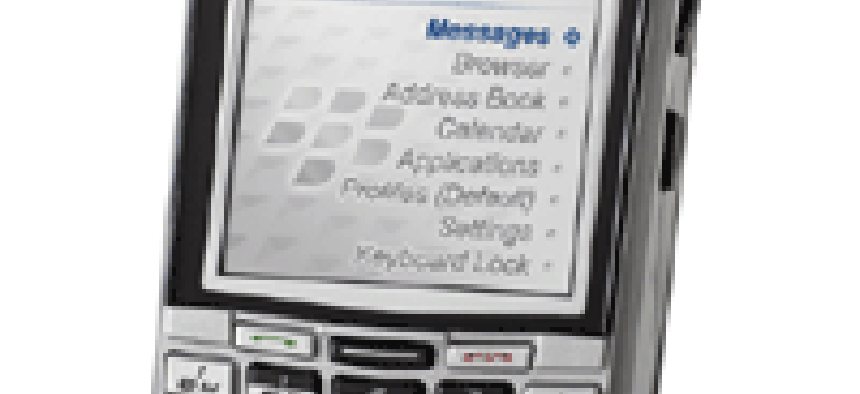It's something of a paradox: From time to time, industry pundits will suggest that all-in-one phones have a limited appeal and a small audience. And then, just to confound things, buyers go out and snap them up. For example, in just a few years, sales of the Treo Smartphone from Palm Inc. of Sunnyvale, Calif., have surged to account for half the firm's overall hardware sales, a company official said.At the same time, other makers continue to bring out new phones that integrate personal digital assistant functions. In September, Nokia Americas of Irving, Texas, will announce a ship date for its new 9300, an all-in-one phone with a large fold-up screen and full keyboard. A final price hadn't been determined by press time, a company spokeswoman said, but the device could retail for around $300 when various discounts and incentives are factored in.Why are more people opting for all-in-one phones? Too many techie things spilling out of one's pocket or purse seems to be the primary reason.And it makes sense. Instead of carrying a cell phone, pager, e-mail device, PDA and digital camera'at least a low-resolution one for emergency use, perhaps'you can put them all together in a single package that fits in your shirt pocket, purse or briefcase, and not have to worry.Such a device 'does 80 percent what a notebook does, but it's with you 100 percent of the time,' said Joe Fabris, director of wireless marketing for Palm.Navigable with one hand, the Treo does its job well because the people who built the phone also built the Palm operating system on which the device is based, Fabris said. That's a plus, since engineers knew that it would be good to add a feature that lets users highlight a telephone number, click on it and have the unit dial'from within any application, he said. The same one-click feature applies to e-mail and Web site addresses, he added.None of this is causing Microsoft Corp. to rest on its laurels: Last May, the firm launched the 2005 version of Windows Mobile, its PDA and all-in-one phone operating system, and chairman Bill Gates trumpeted the firm's success in the mobile phone market, albeit largely overseas.According to Microsoft officials, in 2000, the first Windows Mobile-based Pocket PCs shipped from three hardware partners. Today, they said, 40 device-makers are shipping Windows Mobile products with 68 mobile operators in 48 countries.Microsoft officials said that these hardware and mobile operator partners have contributed to Windows Mobile revenue growth of 31 percent from 2003 to 2004 and phone license sales more than double those of the previous year.'In the past five years, there's been a profound shift in the kind of data and services people access on their mobile devices'from multimedia to business applications,' Gates said in a statement released at the product launch.'Windows Mobile 5.0 enables our industry partners to develop exciting new hardware designs and solutions that will revolutionize how customers use mobile devices,' he said.Ironically, though, the majority of Windows Mobile phone devices use older versions of the OS; only one maker, High Tech Computing Corp. of Taiwan, has announced a phone with the new operating system, but it has yet to reach market, let alone carriers in the United States.That's not the case with Research in Motion Ltd. of Waterloo, Ontario, whose BlackBerry devices are nearly ubiquitous in many government circles. Along with the original BlackBerry product, the firm has offered a range of newer handheld PCs integrating voice and data. Among these is the 7290 handheld, a recent introduction by RIM and wireless carrier T-Mobile USA Inc. of Bellevue, Wash.According to Research In Motion officials, the BlackBerry 7290 features quad-band service based on the globally dominant Global System for Mobile Communications technology (you can use it in Europe) and Bluetooth support. It also boasts 'always on' access to corporate and personal email, phone, text messaging, browser, organizer and corporate data applications.RIM officials said there is also 'integrated attachment viewing' with support for file formats such as Microsoft Word, Excel, PowerPoint, Corel WordPerfect, Portable Document Format (PDF), JPEG, TIFF, ASCII and GIF.Later this year, Research in Motion is expected to offer a way for users whose offices are equipped with Microsoft's Live Communications Server 2005 to remain in touch. Client software is being developed that will let those users send instant messages through the Microsoft platform from phones to PCs to handheld PDAs.'Instant messaging and presence are playing an increasingly important role in helping information workers stay in touch with critical business contacts and make better decisions faster,' said Gurdeep Pall, corporate vice president for the real-time collaboration group at Microsoft, in a statement announcing the move. 'Extending these valuable communications tools from the desktop with Microsoft Office Communicator to mobile devices like BlackBerry is a core element of our vision for integrated communications, which aims to unify communications across PCs, phones and mobile devices so people can communicate and collaborate more effectively and efficiently.'What's in the future for all-in-one phones? More battery life and more storage are in the cards, Fabris said. Models integrating WiFi technology are also on the horizon, although Fabris said a WiFi mobile phone device would not appear anytime soon.'We will make phones that do that,' Fabris said, but only 'when carriers can make money and do handoffs between wireless calls and inside-the-campus WiFi.'But while such a truly all-encompassing phone may not be here yet, that's not diminishing enthusiasm for one product that can make your pocket lighter while keeping you in contact with the rest of the world.
The new 9300 Smartphone from Nokia Americas is scheduled to debut next month, possibly at about $300.
Research in Motion's BlackBerry 7100g smart phone offers Bluetooth connectivity and sells for $199.








